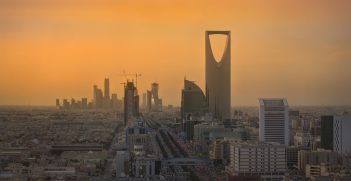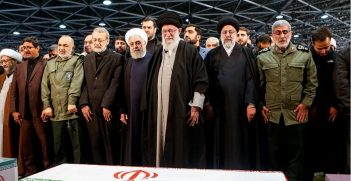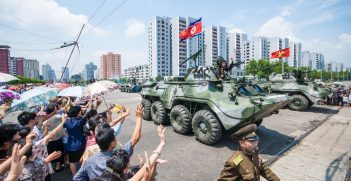The Mysterious Case of the Missing Prime Minister

Lebanese Prime Minster Saad Hariri’s strange resignation left the country puzzling over the reach of Saudi Arabia. Now that he has returned to Lebanon there are still more questions than answers.
Australia is one country that has some experience of missing a prime minister. In Lebanon three weeks ago, the prime minister was not so much swept away by the sea, but by the Saudis. On 4 November Saad Hariri made the surprising statement from Saudi Arabia that he was resigning as prime minister of Lebanon. His justification was excessive Iranian influence in Lebanon and the region and that he feared he would suffer the same fate as his father—murdered in a car bomb explosion in 2005—if he remained in Lebanon.
Immediately after the statement, speculation soared and financial markets plummeted as Lebanese and political commentators alike tried to make sense of what had just happened.
The resignation coincided with a string of arrests in Saudi Arabia, with members of the Saudi royal family accused of corruption by Crown Prince Mohammed bin Salman. Initial rumours were that Hariri was part of this investigation and was under arrest. Identifying the whereabouts of the Lebanese prime minister and his future travel plans became something of a ‘Where’s Wally’ guessing game.
Confusion was followed by the inevitable dire predictions from Middle East pundits that Lebanon was once more about to plummet into war. Six days in, the US woke from the fog of another Trump scandal and issued severe warnings about Lebanon’s stability. All of this seemed somewhat curious to us here in Beirut because, in fact, nothing very much was happening at all.
The reaction to Hariri’s resignation in Lebanon was probably best encapsulated by an apt tweet from satirist Karl Sharro who wrote “Come on man, a political resignation is like a break-up, you don’t do it over the phone”. It was immediately rejected by President Michel Aoun who stipulated that according to the constitution, Hariri must be in the country if he wanted his resignation to be accepted.
Lebanese security institutions stated they had no information about any planned attack on Hariri’s life. Hezbollah leader Hassan Nasrallah called for calm and patience, and reiterated his belief that the entire episode was forced upon Hariri by Saudi Arabia. The response of Hariri’s own party—the Future Movement—was pragmatic, calling for him to return and describing him as a national leader.
The streets were not filled with angry Future Movement supporters denouncing Hezbollah, instead they were filled with supportive signs that read “We are waiting for you” and “Saad’s coming back”. It seemed that the Lebanese had no intention of playing into Saudi Arabia’s hands. An awkward media interview with Hariri on 12 November from Saudi only served to reinforce local views that this was not a decision Hariri had made of his own volition. Calm within Lebanon has until now prevailed.
Hariri has always been considered the Saudis’ man in Beirut, but of late he had been compromising with Hezbollah for the sake of peace and stability in a country greatly at risk of being subsumed by regional conflict. Earlier this year, for example, he withdrew his objections to the appointment of Hezbollah’s favoured presidential candidate, Michel Aoun, enabling his appointment. A recent meeting in Beirut between Hariri and Iranian Ali Akbar Velayati, Iran’s senior adviser on international affairs, was described by Velayati as positive and constructive. It may have been the final straw for the Saudis.
Despite Saudi Arabia’s clumsy attempt to exert regional influence and deflect Iran, which as an act of diplomacy showed all the skill and nuance of the proverbial bull, there is genuine concern that war may be imminent. There is no doubt the ‘crisis’ within Lebanon so swiftly predicted by the Western media has not occurred, but this event is one in a series of unfortunate incidents that may add up to yet another conflict.
Clearly, Iran has grown more powerful in the region, albeit largely through asymmetric tactics. There is speculation that as Saudi Arabia seeks to counter Iranian influence, it will ally more closely with the US and its ready helper in the region, Israel. Saudi-Israeli bonds are rumoured to be growing as Saudi behaviour becomes more belligerent. In a recent statement, Saudi Arabia declared the Lebanese government would “be dealt with as a government declaring war on Saudi Arabia” because it includes Hezbollah. This kind of language is highly reminiscent of Israel’s ‘Dahiyeh Doctrine’, which argues that all Lebanese who do not actively resist Hezbollah are complicit in supporting it and are therefore legitimate targets in the next war.
That there will be another war between Israel and Hezbollah is something Israel has always maintained and having a powerful regional state onside would be an enormous advantage. Now that the threat of the Islamic State is winding down, there is space for Israel to refocus its attention on its real nemesis, Hezbollah.
After weeks of speculation, Hariri’s Scarlet Pimpernel-like existence only ended at the start of this week when he popped up in France, paid brief visits to Cyprus and Egypt, and returned to Lebanon for Lebanese Independence Day celebrations on 22 November.
He was scheduled to meet with Aoun on 23 November to hand in his resignation. However, at Aoun’s request, he has now agreed to postpone formally resigning to “allow for more consultations on the reasons for it and its political background.” The measured response to this crisis by politicians across the spectrum may have given Hariri the space to reconsider and negotiate on behalf of his party’s interests.
Vanessa Newby is a Visiting Fellow at the Coral Bell School of Asia Pacific Affairs at the Australian National University. Her current research focuses on peace-building and peacekeeping in the Middle East.
This article is published under a Creative Commons Licence and may be republished with attribution.





